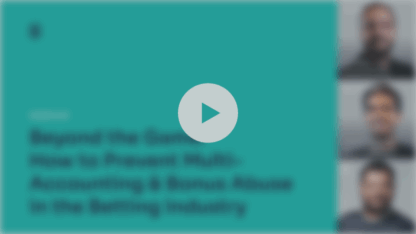It is paid little attention to, yet it costs the online gaming industry up to 15% of its gross revenue.
Bonuses are used to attract people, but also incentivise users to sign up numerous times to receive them. Organised criminals abuse bonuses to resell accounts, cash out at scale, and use advantage gambling to maximise their earnings. Thankfully, multi-accounting is not hard to prevent if you know where to look, and that is exactly what we talk about in this webinar.
Agenda
It was a fruitful conversation, where we touched upon topics such as:
- The average bonus spends for iGaming companies and the cost of manual reviews.
- Real examples of fighting bonus abuse and process change.
- Top tips on detecting and preventing bonus abuse.
- Some of the early mistakes Eurobet made when trying to stop bonus abusers.
Speakers
- Alexis Grigoriadis – Marketing Director for Eurobet in Italy and Ladbrokes in Belgium
- Balint Patkos – Head of Customer Success at SEON
The host was our very own co-founder and COO, Bence Jendruszak.
Key Answers From the Q&A
If you have a good risk management team, would you consider setting up “traps” for bonus abusers?
“Yes, when you realise at the point of the registration that you’re dealing with a bonus abuser, don’t just take away the option for them to continue using the account. Sometimes it’s much more fun – and it will waste the bonus abusers’ time – if you give them fake bonuses. This can take away a lot of their resources. Because they can automate their bots, but what if their bots are playing fake games? Using traps for that purpose is a huge one I think. This helps you capture data that can be used for additional rules or an internal blacklist. If you are able to isolate bot-like behaviour for bonus abuse, you’ll be also able to single out the games they tend to focus on.” – Balint
Is there a way to automatically flag chip dumping in online poker games (when a player intentionally loses to another player)?
“We do have that issue [at EuroBet] but it’s a completely different issue than bonus abuse. It’s a poker network issue. So the B2B [fraud prevention] provider should be able to control it. It’s now pretty fast to do. For instance, if you and I are playing at the same table and chatting at the same time, after a while, the system will catch us.” – Alexis
Why don’t iGaming companies share bonus abusers and self-exclusion request lists?
“It’s a good point. There’s obviously an issue with privacy and the GDPR, so it’s sensitive. It could work, for instance, in Italy, because you have a direct relationship between your fiscal code and the [iGaming] account you’re opening, it could be very effective. But in the UK where you can open multiple accounts with the same name, it would be very difficult to implement. There are a lot of issues from a legal perspective.” – Alexis
How can you deal with users who say they share the same IP, for instance logging in from a public WiFi place?
“It’s very rare that people share the same IP address. It could be me and my brother opening the same account with Eurobet, people living under the same roof, but these are the exceptions. I think that the right approach is the strict one: if you’re all coming from the same IP address I think you’re a fraudster. Then if you’re in good faith and you can contact the operator we can see. But in my experience 99.9% of these cases are abusers. And we’re not talking two accounts, we mean four, five, six accounts with the same address.” – Alexis
“If you only use the IP address detection it’s never going to be trustworthy enough. So you’ll have to combine the IP detection with the email checks, phone number, social messaging platform checks to be much more reliable.”
– Balint
You might also be interested in reading about:
- SEON: Online Gambling Fraud: How It Works & How To Stop It
- SEON: Reducing Bonus Abuse in iGaming
- SEON: How to Prevent iGaming Fraud
- SEON: Stop Multi Accounting Fraud
- SEON: Best Fraud Detection Software
Learn more about:
Device Intelligence | Browser Fingerprinting | Device Fingerprinting








